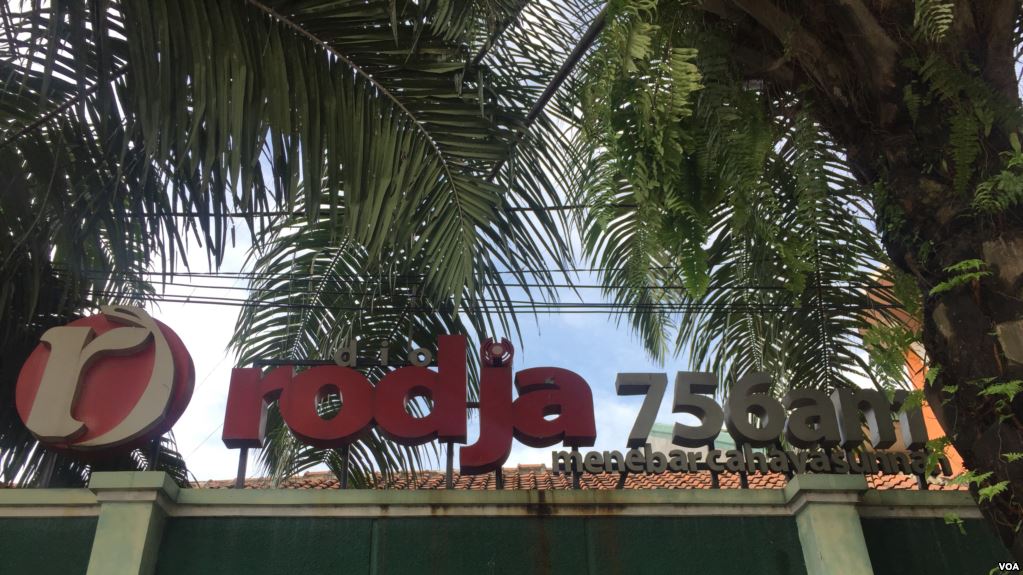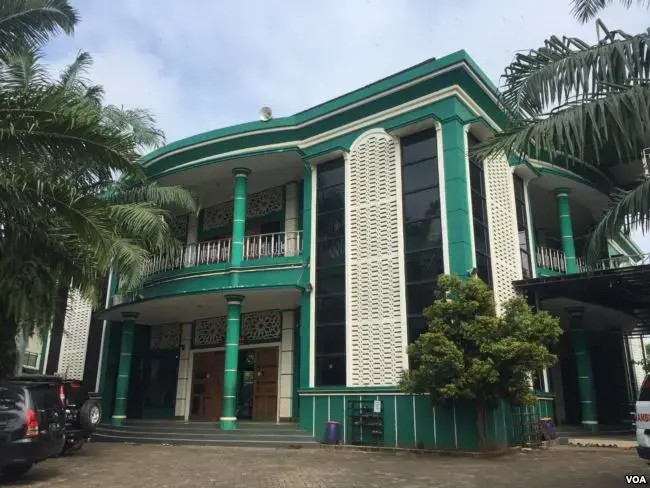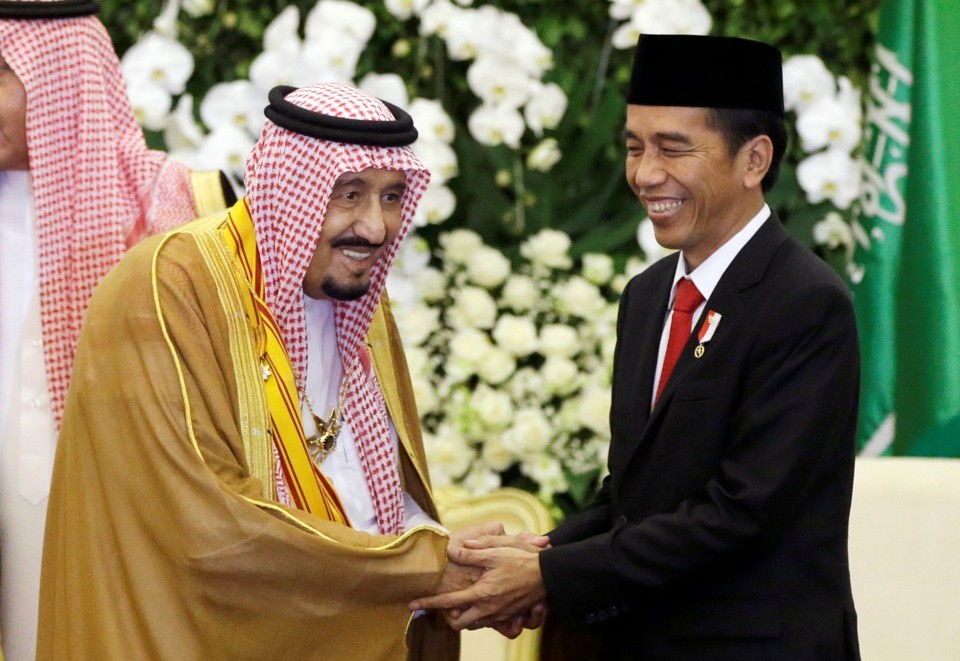
On the drive from Jakarta to Bogor, a hilly regency about an hour south of the Indonesian capital, the polyphonic aural landscape gradually converges on a single voice that’s broadcast from storefronts, food carts, and houses: Radio Rodja, the country’s leading Salafi station.
In 2005, Radio Rodja started as a community production in Cileungsi, a small Bogor town, and obtained an AM frequency two years later, from where it became the most popular of the dozens of Salafi radio stations in Indonesia. In recent years, it has also live-streamed content about 20 hours a day on its website to reach listeners across the country.
The majority of its content is Quran recitations and lectures on theology, conduct, health, and lifestyle. Salafism is a fundamentalist movement, originating in Saudi Arabia, that extols the norms of early, eighth-century Islam and rejects modern cultural “innovations.” It is pointedly quietist, or discouraging political action or extremism, by design, but nevertheless, the rise of Salafi conservatism has caused frictions in diverse and tolerant Indonesia.
Salafism is visibly on the rise in middle-class Jakarta suburbs like Bogor, Depok, and Bekasi, as evidenced by the content of sermons at local mosques, the number of Salafi boarding schools in those areas, and Salafi dress — ankle length pants and beards for men, niqabs and burqas for women — of its residents.
One reason the movement has penetrated these groups is that it directly reaches them through radio and TV stations like Rodja.
Moderate Muslim organizations like Nahdlatul Ulama have pitched halfhearted efforts to counter their influence, but they are stretched thin by their size and dissolute agendas. Salafi media, on the other hand, has a laser-like focus on broadcasting dakwah (proselytization) at all hours of the day. This simplicity is no small part of its popular appeal.
Rodja offices
Radio Rodja is headquartered in a small building complex around Al Barkah mosque. Its facilities include several soundproofed live-broadcast rooms and a large office with 20-odd Apple computers. Rodja staff declined multiple requests to be interviewed, citing previous “misrepresentation” in the press.
A recent weekday’s broadcast included a lecture on signs of the coming apocalypse, another on “becoming a teenager who is loved by Allah,” a listener call-in hour on health, Arabic language classes, and several hours of Quran recital. According to schedules posted on their website, Radio Rodja hosts prominent Salafi preachers from across Indonesia, like Badrussalam and Yazid Jawas, as well live broadcasts from the Jakarta Islamic Centre.

The language of Indonesian Salafi groups has become less provocative in recent years, said Salafi researcher Din Wahid, of the State Islamic University of Jakarta. They avoid certain buzzwords like “heresy” to avoid censure by mainstream groups like NU.
Still, most of Rodja’s content comprises a staunch “rejection of modernity,” according to Ayang Utriza Yakin, a postdoctoral researcher at the Catholic University of Louvain in Belgium who spent six months in 2016 intensively researching the station.
“Almost all the preachers denounce or criticize modernity itself,” said Yakin. “The ustadhs and preachers of Rodja criticize the Internet, technology, and television — at the same time that they use it for their work — because, according to them, it can make people disobey Allah.”
Salafis also believe in traditional family and gender roles, said Yakin. “Radio Rodja propaganda is the very opposite of what women have fought for in recent decades,” he said. “For Rodja preachers, work is not mandatory for women. Work is for men. The women's place in the home. Women’s work poses fitnah [temptation or distress]. It will make men lust. In fact, some say that work for women is forbidden.”
Proliferating
While small stations pop up and disappear with some frequency, there are about 25 core Salafi radio stations across Indonesia, according to the website SalafyForum.net.
Last month in a plenary meeting, members of the enormous moderate Muslim group Nahdlatul Ulama (NU) called the uptick in Salafi media “quite alarming."
“Their dakwah often involves spreading hatred to other groups, is intolerant, and is contrary to the values of friendly and peaceful Islam” said Ahmad Najib, an NU official.
NU has tried to counter some Salafi media by creating a rival bodies. In Cirebon, West Java, which has two Salafi stations, NU set up a “counter-propaganda” radio station. But it’s unclear that these two threads of Indonesian Islam intersect at all, which is to say, whether NU listeners would have ever engaged with Salafi content in the first place.
“Honestly we are doing only a little to counteract Salafi radio,” said Savic Ali, the director of NU Online. “We have set up several networks but none are managed properly.” He said this was a regrettable circumstance since “Salafi views do increase tensions with traditional Indonesian Muslims, especially NU members.”
Ambiguous effects
Salafism has been growing at a steady clip in Indonesia since the 1980’s, but its exact effects are hard to draw out. Certainly, Indonesian society has grown more and visibly religious, but part of that can be attributed to newfound freedom of religious expression after the secular Suharto dictatorship ended in 1998.
Salafism is at odds with the country’s traditionally tolerant form of Islam; it considers Shi'a and Ahmadiyya to be heretics, for instance.
More recently, Salafi networks have become conduits for extremists. Although they are a minority of Indonesian Salafis, there is a strain of jihadist Salafism as represented by the Salafi-influenced boarding school Al-Ngruki in Central Java.
Yakin said according to his research, Rodja is funded by a mix of donations, subscriptions, wealthy Indonesian businessmen, as well as “receiving funds from Saudi Arabia and other rich Gulf states,” the exact details of whom, he said, are still murky.
He maintains that the Indonesian broadcast authority, KPI, “can and should monitor Radio Rodja,and hundreds of other Salafi stations throughout Indonesia.”





